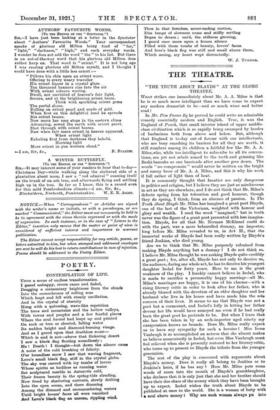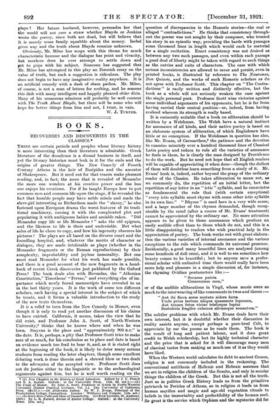THE THEATRE.
"THE TRUTH ABOUT BLAYDS " AT THE GLOBE THEATRE.
WHAT strikes one immediately about Mr. A. A. Milne is that he is so much more intelligent than we have come to expect any modern dramatist to be—and so much wiser and better read !
In Mr. Pim Passes By ho proved he could write an admirable comedy essentially modern and English. True, it was the England of Punch, that small interior island of upper middle- class civilization which is so rapidly being swamped by hordes of barbarians both from above and below. But, although that England is to-day out of favour with our intellectuals, who are busy smashing its barriers for all they are worth, it still numbers among its children a faithful few like Mr. A. A. Milne,who, while too intelligent to subscribe to all its conven- tions, are yet not rebels armed to the teeth and grinning like Bashi-bazouks as one barricade after another goes down. The words " no compromise " would never be written on the bright and sunny brow of Mr. A. A. Milne, and this is why his work if full rather of light than of heat.
It is commonly thought that fanatics are only dangerous in politics and religion, but I believe they are just as mischievous in art as they are elsewhere, and I do not think that Mr. Mihie's defects spring from his toleration and good humour, though they do spring, I think, from an absence of passion. In The Truth About Blayds Mr. Milne has imagined a great poet Blayds, one of the last of the Victorians, weighted with honour and glory and wealth. I used the word " imagined," but in truth never was the figure of a great poet presented with lees imagina- tion. Blayds, for all that Mr. Norman McKinnel could do with the part, was a mere belaurelled dummy, an impostor, long before Mr. Milne revealed to us, in Act II., that the immortal works of Blayds had been really written by Blayds's friend Jenkins, who died young.
Are we to think that Mr. Milne purposely refrained from making Blayds anything but a dummy ? I do not think so. I believe Mr. Milne thought he was making Blayds quite credibly a great poet ; for, after all, Blayds has not only to deceive us, the audience, during one whole act, he has to deceive his youngest daughter Isobel for forty years. Here to me is the great weakness of the play. I frankly cannot believe in Isobel, who is made to sacrifice a presumably happy marriage—all Mr. Milne's marriages are happy, it is one of his charms—with a rising literary critic in order to look after her father, who is already blessed with the devotion of an elder daughter and her husband who live in his house and have made him the sole concern of their lives. It seems to me that Blayds was not a poet but a cormorant, and Isobel's folly in letting her father devour her life would have annoyed me even if he had really been the great poet he pretends to be. But when I learn that she has been taken in by an arch-impostor aged ninety my exasperation knows no bounds. Does Mr. Milne really expect us to have any sympathy for such a heroine Miss Irene Vanbrugh is so accomplished an actress that she almost makes us believe momentarily in Isobel, but even Miss Vanbrugh must feel relieved when she is presently restored to her literary critic, who turns up to present to Blayds the tribute from the younger generation.
The rest of the play is concerned with arguments about Blayds's money. Does it really all belong to Jenkins or to Jenkins's heirs, if he has any ? Here Mr. Milne puts some words of sense into the mouth of Blayds's granddaughter, who declares that it is only just that she and her brother should have their duo share of the money which they have been brought up to expect. Isobel wishes the truth about Blayds to be published at once to the world. She is a woman of forty with a soul above money Why are suoh women always pu into
plays ? Her future husband, however, persuades her that the world will not care a straw whether Blayds or Jenkins wrote the poetry, since both are dead, but will believe that it is merely some family squabble about the money. Isobel gives way and the truth about Blayds remains unknown.
Obviously, Mr. Milne has scope with this theme for much characteristic humour and the dialogue has point and vivacity, but nowhere does he ever attempt to settle down and get to grips with his subject. Someone has suggested that Mr. Milne has attempted in this play an Ibsenish essay on the value of truth, but such a suggestion is ridiculous. The play does not begin to have any imaginative reality anywhere. It is an artificial comedy with a dash of sham pathos. Mr. Milne, of course, is not a man of letters for nothing, and he seasons this dish with many intelligent and happily phrased obiter dicta. Many of his numerous admirers will probably be well content with The Truth About Blayds, but there will be some who will hope for better things from him and not, I trust, in vain.
W. J. TURNER.



































 Previous page
Previous page